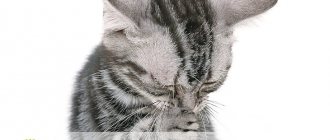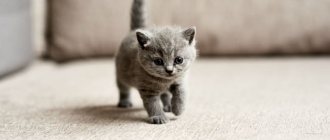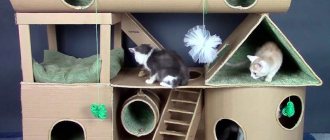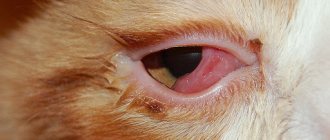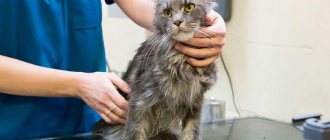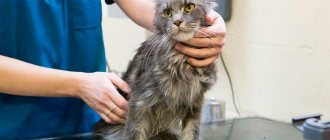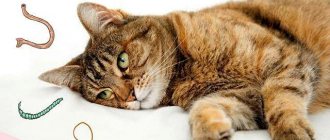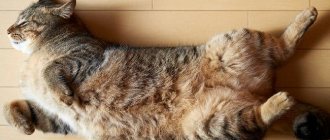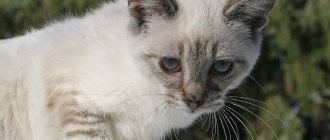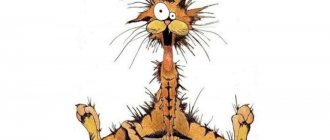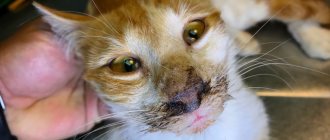The first months of a kitten's life are characterized by rapid growth. For a kitten, this is a time of discovery and awakening. For their human caregiver, this is a time of both joy in this new life and concern for them getting the best start. In cases where we think that the kitten is not growing as quickly as it should, this problem can become acute. A kitten's vulnerability makes it especially susceptible to parasites and disease. Improper feeding can also hinder their development. However, there are various reasons why a kitten is not growing.
This article looks at these reasons as to why a kitten is not growing. We explain why a cat may not develop and what to do about it.
Why doesn't the cat grow?
Usually, a furry baby that appears in the house develops quickly, which certainly pleases its owners.
But quite often it happens that it does not reach the required size at a certain age. An attentive owner will immediately notice this and think about why the kitten is not growing and how to fix it. In this situation, only a veterinarian can give a complete, and most importantly, correct answer after an individual examination of the animal. After all, the topic of poor growth of pets is relevant and requires certain knowledge to correct the situation.
The main reasons for stopping or stunting a kitten's growth
If a kitten has problems, their consequences will become noticeable in the first month of life.
The main reasons why a kitten does not grow are::
- Poor, insufficient nutrition. In the first month of life, a kitten may suffer from a lack of milk from its mother cat. In older age, nutrition is most often simply inadequate; it lacks either nutrients or calories.
- Unbalanced diet and regimen. When a kitten does not eat well or the normal feeding regime is disrupted, then it gains little weight. In particularly advanced cases, it does not grow at all.
- Heredity or genetic abnormalities. When getting a purebred kitten, you need to know exactly what diseases it can get from its parents. This will significantly save time when identifying the reasons for poor development and will allow you to quickly decide what to do in the current situation. In addition, it is worth considering what size the pet’s parents were at the same age. It is quite possible that if the kitten is in good health, it does not grow and remains quite small, because its parents were not large either.
- Viral and infectious diseases. Often, being underweight is a consequence of past illnesses. Infections, affecting the kitten’s fragile body, lead to disruption of the gastrointestinal tract, which impairs the absorption of nutrients. Accordingly, their level in the blood decreases sharply, the organs do not receive enough of the materials they need, and the kitten grows slowly or stops gaining weight altogether.
- Infection with worms. If a kitten gets worms, this inevitably leads to sad consequences. Whatever the age of the pet, helminthic infestations will always be dangerous to its health and even life. Because of them, the kitten not only grows poorly, but can also die.
The dangers of excessive fattening
For those owners who want to fatten their pet for their own aesthetic needs - to admire how funny the cat licks or runs - it is useful to learn about the consequences of feline obesity. Since obesity in cats, like in humans, is a disease, a fat cat will sooner or later face health problems, including:
- Diabetes of the second type - being initially not prone to diabetes, your pet can develop it with an incorrect lifestyle and, in particular, nutrition.
As a result, the owner will have to periodically inject insulin into the cat in order to avoid a sharp deterioration in his health; Diabetes is one of the most dangerous consequences of overfeeding a cat. - Cardiovascular diseases - the higher the weight of the animal, the greater the load on the heart.
Overweight cats, as a rule, rarely move and prefer a recumbent lifestyle, which only aggravates the situation; Gaining excess weight is fraught with heart attacks leading to heart attack - High probability of joint injury - any long-distance jumps can result in dislocations, or, in the worst case, fractures.
Since the bones and joints of each cat are tailored to a certain body weight, which has its own threshold, going beyond its limits is fraught with all sorts of injuries; Overweight cats have a more difficult time recovering from fractures due to the heavy load on the joints. - Predisposition to arthritis.
Fat animals are the first at risk in terms of the likelihood of becoming acquainted with this unpleasant disease, accompanied by inflammation of joint tissues and deformation of the limbs, not to mention purulent complications; In advanced cases, arthritis can only be treated with a surgical scalpel - Hypertension - this disease is difficult to diagnose in the initial stages, but its harm to the entire body is very great. In its chronic form, hypertension leads to hypertrophy of the heart muscle, which, with the least favorable prognosis, ends in cardiac arrest.
Keep in mind that a deviation of one and a half kilograms from the norm is already considered obesity and unsafe for the pet’s health. Since pets differ significantly from us in size, they only need to gain a few hundred grams for this to become noticeable. You can read about the process of losing weight in cats on our portal.
Video - Consequences of obesity in cats
What to do if the kitten does not grow.
As soon as it becomes noticeable that his kitten is no longer growing, you should urgently contact a veterinarian, because each case is unique and requires an individual examination. Most often, the diagnosis will be one or more of the above reasons. They are eliminated like this :
- The kitten's diet and diet are being reviewed. If tests confirm a lack of vitamins, macro and microelements, then a course of vitamin complexes is prescribed, after taking which the pet quickly grows and develops again.
- Hereditary and genetic diseases, in most families, cannot be treated. But you can always slow down their progression with medication, blunt the development of consequences and improve the kitten’s condition.
- Infectious diseases are treated with medications. Afterwards, you need to adhere to a certain diet for some time, after which the kitten grows normally again and gains weight.
- Worms are also treated with medications. But it’s better not to wait for them to appear, but to do preventive measures two or three times a year.
Thus, to find out exactly why a kitten is not growing, it is best to consult with a specialist who will identify the cause and prescribe the correct treatment for your pet.
When to sound the alarm
It is risky to specifically fatten animals if they are not getting fat. Probably, a cat, by its breed, cannot be fat or thin. The weight of Maine Coons can reach 10 kg, and yard cats, as a rule, always remain “slender”. In order for a cat to get better, the diet changes, but the characteristics of the breed and the individual parameters of the body are first studied.
© shutterstock
You should contact your veterinarian if:
- The cat refuses food for a long time. If the animal does not gain weight, it may be due to dental disease, which can lead to a complete loss of appetite.
- Unpleasant smell. Pathologies of the gastrointestinal tract lead not only to the fact that the cat does not gain weight, but also affects the internal organs. Doctors will check your kidneys, intestines and liver.
- The animal behaves apathetically. Health problems are indicated by lethargy and sudden activity, prolonged drowsiness. This is not typical for kittens and young individuals.
- The cat has diarrhea and constant vomiting. Mild poisoning lasts no more than 2-3 days. A stomach disease is indicated by the fact that the cat does not gain weight for a long time, and meals are accompanied by vomit and loose stools.
A cat does not get fat if its diet is constantly changing. For a pet, unlike a person, monotony is optimal. This is natural food or industrial, artificially produced and offered in finished form.
Purchasing ready-made formulations from pharmacies is a priority. This is a guarantee that the food meets its production date and expiration date, is certified and has passed medical tests. If the cat does not gain weight due to illness, you can buy special medicated food.
Useful materials:
- Cutaneous horn General description of the disease Cutaneous horn on the forehead or face (ICD 10 code - L57.0) -...
- Itching and odorless discharge Main causesBefore considering the factors that provoke the appearance of discharge that has a sour odor, it is necessary to immediately note...
- Normal temperature in animals Normal temperature in different types of animals Veterinary services Day hospital for animals Veterinary certificates Vaccination…
- Discharge in women What kind of discharge between menstruation is considered normal? Female discharge normally consists of mucus from the cervical canal, dead...
What to do if the cat is not growing?
What should an owner do if he notices signs of slow growth or cessation in his pet? People who are interested in cats and their lives have probably heard more than once that kittens sometimes do not want to grow up. Indeed, cases where kittens grow very slowly or suddenly stop growing are not so rare.
For the development of a kitten and its growth, first of all, proper and balanced nutrition is important.
It must contain a sufficient amount of nutrients, as well as all the vitamins and minerals necessary for the growth and development of a young body.
It's no secret that animals - just like children - grow quite quickly.
When a cat needs feeding
Before you start fattening a cat, you need to understand the reasons that prompted the owner to make such a decision. If cats are not sick or hungry, they are able to independently control their weight and the amount of food they consume.
Not all cats need an increase in diet
Among the good reasons why a cat owner can begin to purposefully feed him are the following:
- Gaining normal weight after a debilitating illness.
The most common cause of weight loss in cats is all kinds of parasites that literally suck all the vitality out of the cat. Other pathologies that negatively affect an animal’s weight include gastritis, ulcers, and other digestive disorders. Such an innocent thing as dysbiosis in its neglected form leads to frequent vomiting, and – as a result – rapid weight loss. All of these conditions are abnormal for a cat and require a balanced diet for weight gain; Recovery from illness takes a lot of resources from the body and takes time. - Restoring selected cats to home conditions.
Stray animals cannot boast of a proper diet and intake of all important vitamins and minerals. Such individuals end up in their owners’ homes with varying degrees of neglect. The owner’s tasks include showing the kitten (or adult cat) to the veterinarian, examination, vaccination and development of further diet; At home, previously homeless cats do not immediately get used to the abundance of food. - Fitting the cat to show standards.
This item applies to that small group of owners who demonstrate their purebred individuals at exhibitions. Since each breed has its own requirements in detail, deviations from the specified weight are unacceptable. However, if this deviation occurs, then the owner should think about its reasons before starting fattening. Typically, purebred cats correspond to the weight stated in the standards with minor deviations. If careful feeding is required for the exhibition, then this is a reason to show the pet to the veterinarian; Exhibition animals are subject to strict weight requirements. - Recovery of a cat after prolonged stress.
This situation is quite rare, but it happens that pets are taken from specific owners who monitored the health of their cats, but treated them inappropriately. Unfortunately, sadism against animals still occurs today. Prolonged negative experiences and depression can lead to a complete loss of appetite and poor digestion of food, which the new owner must gradually rid his pet of; Many cats lose their appetite when faced with intense negative experiences. - Depletion of the body of an elderly cat.
Cats that are over ten years old are not often seen as fat or even well-fed. Despite the gradual slowdown of metabolism and a general decrease in activity, the bodies of older animals lose body weight. This happens for various reasons, for example, tooth decay and the inability to chew food without accompanying pain. The diet of aging individuals, as well as the diet of kittens, must be carefully monitored, since any wrong movement can end badly for the fragile health of the pet. Aging cats are more sensitive to low-quality or too strong food
What to do if the kitten is not growing? Why the kitten is not growing: indicators of kitten development
Domestic cats usually boast a stable appetite and approximately the same weight within ten kilograms. Why is the kitten not growing, and is it possible that the problem arose due to genetic problems in the baby’s parents?
Causes of delayed development
Why a cat is not growing is a serious question that must be resolved based on the well-being of the pet, its age and genetic indicators of the species. Growth problems in a baby may arise due to similar abnormalities in the parents. If the baby’s father or mother is not of decent size, then he could inherit this feature at the genetic level. These kids grow much slower than their peers, but at the same time they play actively and eat a lot.
Another problem that can explain what is happening is the presence of worms in the kitten. These parasites negatively affect the animal's body, preventing it from developing normally. As a result, the baby grows extremely slowly, and his immune system is always under threat.
Why doesn't the kitten that was the smallest in the litter grow? Here we can talk about insufficient nutrition from the first days of life. Those babies who are the weakest in the litter usually receive little milk. As a result, their stomach is narrowed, and in the future, even with a normal diet, the pet will consume very little food. Poor appetite will lead to the fact that the kitten will develop very slowly, and various diseases will overcome it on a regular basis.
It is difficult to make a diagnosis on your own, but you should not ignore the problem. The veterinarian will be able to assess the situation and find out why the kitten is growing so slowly.
Sometimes growth problems occur in a kitten due to problems with the digestive system. In such a situation, the cat eats a lot and consistently, but the food is poorly digested, and slow digestion negatively affects natural growth.
Anorexia in a cat
The topic of such a specific illness as anorexia requires special attention. This disease is widespread not only in the human world, but also in the animal world, which only a few pet owners know about. Anorexia should not be confused with extreme malnutrition, as it is only one of the possible consequences. Anorexia is a refusal to eat due to lack of hunger.
Long-term anorexia leads to the transformation of a cat into a “living skeleton”
In people, food aversion is associated with aversion to it, with vomiting, neurotic and psychotic states. But what can we say about cats? Why do these domesticated predators go against their survival instinct and condemn themselves to a balancing act between life and starvation? There are several reasons:
- Damage to sensory organs.
Having suffered serious head injuries or having been in an accident, a cat may lose its sense of smell or touch, which will lead to a rejection of the texture of food, its smell and taste. Such cats literally do not perceive food as food, and therefore refuse to eat; It is enough for a cat to lose his sense of smell to stop eating food. - Taking a course of chemotherapy.
Chemotherapy has a radical effect on the bodies of both humans and animals. During treatment for malignant tumors, the cat may lose interest in food and become lethargic and apathetic. Any aggressive treatment entails a protest from the body, often expressed in refusal to eat; The poisons that permeate the animal’s body during chemotherapy kill all appetite. - Postoperative period.
Recovery from anesthesia is very difficult for cats and is accompanied by loss of balance, psychomotor disinhibition, and loss of time and space. In this state, cats can hardly reach the litter box, let alone the food bowl. Even several weeks after major operations, pets may not recover and feel an unpleasant aftertaste from anesthesia. Rehabilitation time is accompanied by various changes in the cat’s perception of the world
The problem of anorexia cannot be solved by fattening. Since this serious condition occurs in emergency cases, its management should be left to a veterinarian. Sometimes cats are given IV drips so that the animals can receive nutrients through a vein. Sometimes special devices (for example, probes) are used to put food into the pet's mouth.
Ways to combat stunted growth
Why a kitten grows poorly is a natural question, and methods of dealing with the problem should be tailored to the cause of its occurrence. For example, a kitten may suddenly stop growing due to the development of infectious diseases. In such cases, babies lose their appetite, their activity decreases, and, on the contrary, their temperature increases. Infectious diseases should be treated only with special medications and only after careful consultation with a veterinarian.
If the baby has a decreased appetite, then veterinarians advise introducing special vitamins into the diet or using little tricks. 10-15 minutes before food is served to the cat, you need to lubricate its nose with milk. By licking the milk, the pet, without realizing it, will awaken its appetite, and the entire portion of the food provided will be eaten.
An unbalanced diet is a common problem that can cause a kitten to grow very slowly. It is necessary to ensure that the animal’s food contains meat, milk, and plant products. Protein is especially important for babies, as it affects growth and strengthens bones. That is why dairy products become the basis of the diet for kittens under six months of age. It is also not recommended to suddenly change the animal’s diet, otherwise its appetite may decrease, which will immediately affect the pet’s natural growth.
Sometimes developmental and growth problems occur due to the development of chronic diseases in a pet. In such cases, you have to regularly undergo medical examinations and purchase preventive medications for the cat.
Slow growth of a kitten is always an alarming symptom and should never be ignored. The faster the owner finds out the cause of such a problem, the greater the chance that it will be possible to get rid of it in time without consequences for the health of the animal.
Malnutrition
One of the most common reasons why a kitten is not growing or gaining weight is a lack of food. The smallest babies may simply not have enough mother's milk. In this case, you will have to feed the kittens manually. At an older age, the kitten does not grow due to the too meager rations that it receives. Normally, a one and a half month old baby is fed up to 5 times a day. At this age, his stomach is small and cannot accommodate large volumes, so he is fed often, in small portions.
Unbalanced diet
An unbalanced diet is the second most common reason that a kitten does not grow or gain weight. Delay in development occurs as a result of feeding food that does not contain the substances necessary for its growth - proteins, fats, vitamins and microelements. If the animal is not fed properly, it may show signs of rickets and anemia. The kitten is not growing, the weight gain is very insignificant, it is lethargic and sits near the bowl for a long time, waiting for more nutritious food. If these signs appear, you should review your pet’s diet and adjust it according to its age.
Teenage years
Scottish cats stretch in length during adolescence, and their weight does not keep up with their height. During the ugly duckling period, they often begin to look ugly, and owners get upset, thinking that it will always be this way. There's no need to get upset. But you need to pay attention to the quality of the diet, because if a cat does not receive enough calcium, vitamins and other nutrients during adolescence, its skeleton and muscles may not form correctly - and subsequently it will not grow up to be as beautiful a cat as it could have grown up to be.
Worm infestation
Worms can also lead to weight loss. In this case, the kitten does not grow or gain weight due to the fact that the parasites suck out all the nutrients from the food, leaving nothing for its owner. A characteristic sign of helminthic infestation is the animal’s good appetite with low body weight gain. The kitten is not growing or gaining weight, although it is eating well and its tummy feels firm to the touch. Constipation or diarrhea may occur. When examining stool, helminth eggs are found. How to deal with this disease is here.
Viral infection
Infectious diseases, colds or intestinal diseases are another common reason that a kitten is not growing or gaining weight. The mucous membrane through which nutrients are absorbed is affected. Even if the baby maintains a good appetite, the supply of proteins, fats and carbohydrates necessary for his growth and development slows down greatly or stops altogether. The kitten does not grow and does not gain weight, since its body simply has nothing to build its cells and tissues from.
Sometimes a kitten does not grow or gain weight even some time after the illness due to deep organic damage to the intestines. In this case, the recovery period is delayed and the owners feel that the kitten is not growing. In this case, there is no need to panic. A few days of a gentle diet, a course of vitamin therapy and the weight quickly returns to normal.
Genetic abnormality
Very rarely, the reason that a kitten does not grow and does not gain weight can be a genetic anomaly, which results in dwarfism of the animal. As a rule, these are babies abandoned in early childhood by their mother cat, who have visible defects in skeletal development. Such a kitten does not grow due to underdevelopment caused by the mutation.
Unfortunately, such animals have very little chance of survival, since internal organs and the musculoskeletal system are also affected. Such a kitten does not grow, does not gain weight, and often gets sick. Its lifespan is usually no more than a few months. There is no cure. Vitamin therapy, immunostimulants and a special diet can be used as supportive measures.
In conclusion, it only remains to add that, regardless of the cause of growth retardation, you should not self-medicate, especially if there is an infectious disease or the kitten is not growing due to pathology of the internal organs. At the first signs of illness, you should contact a veterinarian who will conduct a full examination and prescribe treatment.
Did you like the article and was it useful? Please share with your friends.
How to make a diagnosis?
Only a veterinarian can make an accurate diagnosis. Make an appointment with a specialist to undergo a complete examination. The doctor will examine the kitten and prescribe the necessary tests:
- biochemical analysis of blood and urine,
- X-ray examination of the spine,
- histology of bone tissue.
This is necessary to exclude the possibility of the kitten developing diseases with similar symptoms (for example, false rickets or polyarthritis).
